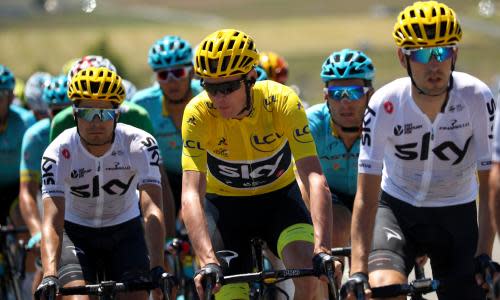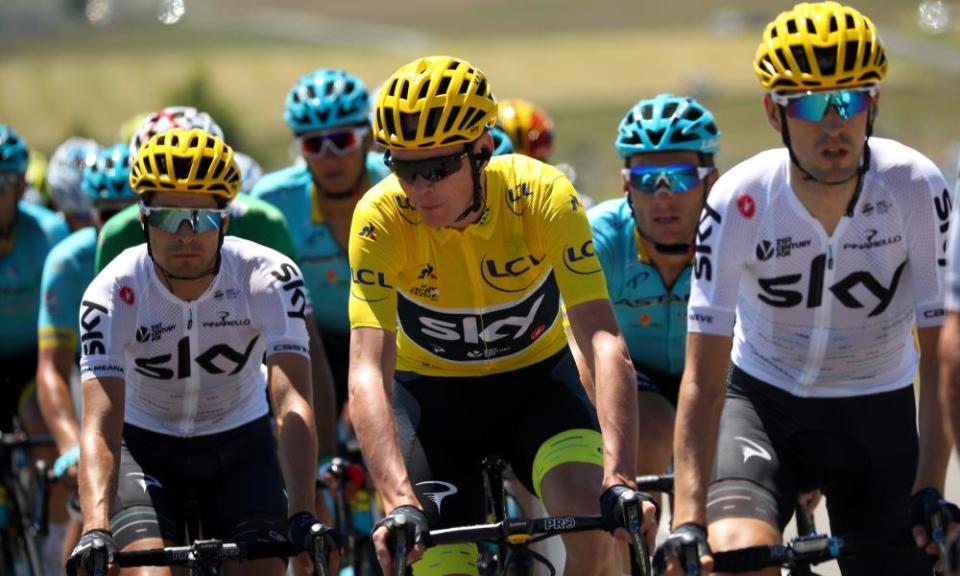Five reasons why Chris Froome and Team Sky dominated the Tour de France
1) Race management and high levels of concentration
Apart from his 200 metres of weakness at Peyragudes, Chris Froome managed this Tour brilliantly, fighting for every second, never ceding an inch, hanging on to the advantage he gained in the opening time trial, all the while believing firmly he would gain time in the final contre la montre. He also did enough in the mountains – on the Mur de Péguère, on the Izoard – to make his opponents believe that he could climb with the best. The best and perhaps most important example of his unremitting ability to keep concentrating day-to-day was the uphill finish at Rodez where he regained the yellow jersey from Fabio Aru.
2) The invaluable support of his team-mates
Froome clearly had the strongest back-up in the race, with Team Sky usually present in vastly superior numbers when the selections were made in the mountains. That meant they could use their usual tactic of riding tempo to deter attacks, for example as Dan Martin found out on the Galibier and Izoard. Their race management was excellent, notably at Peyragudes, where Froome felt under‑the‑weather well before the finish, but their director sportif kept the team riding at pace to bluff the opposition into thinking all was normal. At the key moment when Froome had the wheel change on the road to Le Puy en Velay, Sky were there in numbers to help him, and they did so calmly.
READ MORE: Chelsea guide to the 2017-18 Premier League season
READ MORE: Manchester United guide to the 2017-18 Premier League season
READ MORE: Manchester City guide to the 2017-18 Premier League season
Finally, their move in the wind en route to Romans-sur-Isere was tactically brilliant – it gained them time on Martin in particular and forced rivals like Aru and Bardet into working harder than they would have liked approaching the Alps. Tour winning is a habit and Sky have far more practice at it than any other team. As with other Tour winning machines in the past – Merckx’s Molteni, Indurain’s Banesto and Armstrong’s US Postal – the wealth of collective experience means newcomers fit into an established template.
3) Tour winners always ride their luck
This is not something that should be dismissed, or seen as a negative. There are riders who are accident prone – notably Geraint Thomas and Richie Porte, but Tour winners tend to make their own luck, particularly by staying calm at key moments, which is where Froome’s immense numbers of days in the yellow jersey comes into play. The loss of Thomas in particular obviously changed the course of the Tour, as – arguably – did the crash to Jacob Fuglsang en route to Pau. The disturbing thought is that even without Thomas, Sky were still imperious. Froome had plenty of minor issues – mechanicals, exits from roads on corners, but here, as Tour winners always do, he rode his luck. Had Thomas remained in the race, Sky’s collective strength would have probably ensured they ended up with two riders on the podium.
4) Saving energy through conservative racing
Froome and Sky had a game plan for this race, the Briton explained, which was to race conservatively, snatching seconds where possible and concentrating on not losing time rather than expending energy on spectacular attacks to gain substantial amounts of time. For this strategy to work, Froome’s main rivals had to buy in by racing conservatively themselves, and this is what they did. The stages to Foix and Le Puy en Velay should have provided openings – possibly also Peyragudes – but Aru, Bardet and Rigoberto Uran were never willing to chance their arms. This is a familiar factor in the Tour – the value of a place on the podium or even in the top 10 for some teams is so high that riders would rather hang on for the place they occupy than take risks.
5) Lack of another Grand Tour contender
The stars aligned for Froome in that the field lacked a mature rival with Grand Tour winning experience in decent form. Nairo Quintana should have played that role, but was evidently fatigued, possibly due to riding in his fourth consecutive Grand Tour for the win. Alberto Contador is over the hill. Vincenzo Nibali was notable by his absence, and Aru was hamstrung by the loss of his two strongest team‑mates, Dario Cataldo and Fuglsang, plus he is still callow in terms of racing the Tour. Two other seasoned contenders in Alejandro Valverde and Richie Porte were eliminated by crashes during the race. Similarly, Thibaut Pinot was off form after the Giro, while Esteban Chavez was a shadow of himself. This should not detract from Froome’s victory in the slightest – in the Tour, as in all of sport you have to be in it to win it.

 Yahoo Sport
Yahoo Sport 








































